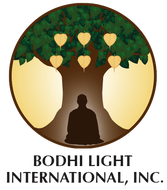|
Why do we advocate emptying the Self? What is the Self? How can the Self be emptied? Those who have been exposed to Buddhism may have heard about the Self being empty.
First of all, I can assure you that we Buddhists are normal people like yourselves. At least, most of us do feel pain when pinched, get misty eyes when hearing a sob story, and are not that crazy about long cold winters. Then why do we advocate emptying the Self? What About Emptiness? Buddhism is also known as the Dharma Door of Emptiness (Chinese: Kong mén 空門, Vietnamese: không môn). A sophisticated person would explain that things are intrinsically empty because they arise from conditions. When conditions disperse, they return to emptiness. For example, our body is made up of the four great elements of earth (making our flesh and solid parts), wind (e.g. our breathing), fire (body warmth) and water (our bodily fluids). We obtain our body through various conditions such as our parents and prior affinities with them. When the various conditions run their course, we must give up our bodies and disappear. Such is the nature of all things. Nothing lasts forever. Everything inexorably evolves toward its own demise. In other words, if we observe everything long enough, all things eventually return to emptiness. Thus, it is fair to conclude that everything is empty. By the way, Buddhism clarifies this point and suggests that if our planning horizon is long enough, we should take into account this emptiness concept and help to diminish our multitudes of attachments to things such as cars, houses, food, etc. Clearly, fewer attachments to worldly things make us more nimble (i.e. more clear headed), more at ease (i.e. have fewer worries), and happier (i.e. know contentment). What Is the Self? Again, that sophisticated person would proclaim that what we perceive as the Self, does not really exist. For example, if you consider that your body is the self (a rather common attitude), then what about our consciousness and soul? One could make the case that the intangible aspects of our existence are pretty important because we are more than a physical body, and certainly more lively than a corpse. In general, people have a rather unclear notion of the Self. Let’s face it, to the best of our knowledge, we know very little about our brain’s workings and capabilities. Never mind you might say: “I’m perfectly content with myself”. Why? “I have a good job; I’m in love with my husband, our children are well behaved, and we have a good family life.” Well, at the moment, the Self is content. Is it always the case? Were you this way before you had a family? What guarantees do you have that this can last? In Buddhism, we like to point out that the Self that is happy is the same Self that will change its mind and become unhappy when conditions change. Such are the ups and downs of life, you may say. We say: it’s not about life, it’s about the ego’s reaction to life. The more attachments we (our egos) have, the more things there are that can go wrong. Remember? Things inexorably deteriorate and so does our temporary contentment. On top of this nebulous notion of an ego, the Self, as we perceive it, is constantly evolving. That is, once we are past our youth, we begin to inch ever closer to emptiness (death, if you will) as time passes. In short, this Self of ours is both the source of happiness and unhappiness, depending on external conditions. To the Buddhist, the best way to put an end to all these gyrations and aberrations is to empty the Self. Emptying the Self How can the Self be emptied? No, we’re not advocating that you lose weight or give away your cherished organs! What it really means is that we should consider cutting off our attachments. Attachments to things that we consider important bog us down. Let’s face it: most of us practice selective memory retention. We prefer to magnify and day-dream about those two-minute rides at the fair. We conveniently choose to forget about the long wait that preceded it. Also, we quickly sweep under the rug the deflation we felt once the fun ended. Technically speaking, these various attachments make us scattered and create emotional ups and downs. Without such attachments, we would be able to enter samadhi (i.e. focus our mind) and enjoy the bliss of samadhi. Higher level practitioners can then gradually enter higher level of samadhis (i.e. increased concentration power). One such high level of samadhi is called “the Patience of Non-Production of Dharmas” where the ego stops functioning and the bliss is really inconceivable. That’s why the Buddhists understand the desirability of emptying the ego. Doing so makes you happier. Have a happy day! |
|
RELATED LINKS© 2010 – 2023 Chanpureland.org
|
SubscribeJoin our mailing list today!
|

 RSS Feed
RSS Feed